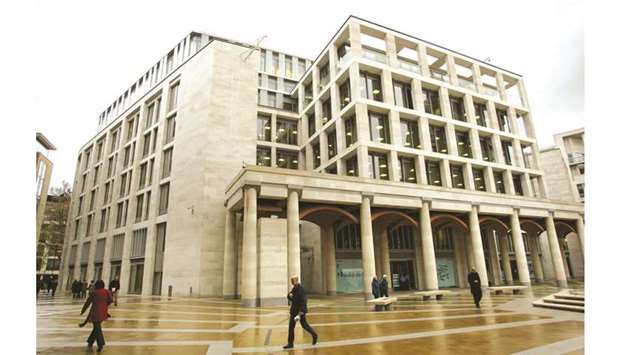In a year marked by political turmoil, UK stocks were widely shunned by investors awaiting clarity on Brexit. Some of the companies that fared best were ones that are most dependent on their home market.
The FTSE All-Share Index is up 15% this year, trailing the 24% jump in the regional Stoxx Europe 600 gauge.
Stock buyers returned after the mid-December election gave Prime Minister Boris Johnson’s Conservative Party an 80-seat House of Commons majority, strengthening his power to set terms for the UK’s separation from the European Union.
Light-systems producer Luceco Plc gained the most in 2019 with a more than threefold surge, while news publishers and specialised consumer-oriented companies at least doubled in value.
Shares in UK companies are due for a “period of valuation catch-up” against other developed markets, said Gervais Williams, the head of equities at fund manager Premier Miton Group .
“Overall, we expect the UK stock market to be one of the best performers going forward, especially within domestically focused businesses that are mainly outside the FTSE 100 Index.”Below we look at a curated list of some of the most interesting winner and loser stock stories in the FTSE All-Share Index in 2019.
The winners
Luceco (+257%): The UK lighting manufacturer has been recovering from profit warnings in past years and winning some praise from analysts as it starts to rebuild a decent track record on earnings.
Still, the stock remains 6.5% below its 130 pence-a-share initial public offering price in October 2016 after sinking below that level two years ago.
Future (+205%) and Reach (+103%): These two companies are rare examples of publishers that are succeeding in the 21st century. Future, a digital magazine firm, has been consistently topping expectations and snapping up rivals in the sector.
Analysts see a potential 14% gain in the stock in the next 12 months, bolstered by better margins and more takeover opportunities. Reach, the owner of the UK newspapers Daily Mirror and Daily Express, has also been buying more assets as it reaps the benefits of shoring up its finances in recent years.
Pets at Home Group (+141%); JD Sports Fashion (+141%); Dunelm Group (+114%): Three of the success stories of the UK retail industry this year – pet-products seller Pets at Home, sneaker merchant JD Sports and home wares chain Dunelm – have all consistently beaten expectations.
JD Sports even has the auspicious title of the FTSE All-Share’s best stock of the decade.
All three are reaping the benefits of tailoring their offerings to customers, including Pets at Home’s addition of veterinary surgeries and JD Sports’ successful loyalty programme.
IWG (+109%): Even as the archetypal US flexible-office firm WeWork crashed and burned, its older UK peer thrived. IWG, owner of the Regus brand, switched strategies to a franchise-focused model and is now looking to acquire smaller players struggling in the shadow that WeWork has cast over the sub-sector.
The Losers
Metro Bank (-87%): The high-street lender’s annus horribilis included plunging after reporting it had misclassified assets, briefly becoming the centre of M&A speculation and spending a good portion of the year trying to shore up finances with bond sales and an equity issue. It will start 2020 with a new boss.
Sirius Minerals (-83%); Petra Diamonds(-77%): The business of digging up potash and diamonds proved tough gigs for two stocks in 2019. Sirius, betting on building a huge potash mine in Yorkshire, plunged after financing for the project fell through.
For Petra, it has been a rough year to be in the diamond game as an inventory glut has hit prices, and there are warnings this will remain the case in 2020.
Kier Group (-76%): The UK construction and infrastructure company ended 2018 on a poor note, and its woes continued into 2019, with the stock crashing because of concerns about debt and an outlook cut.
Those ultimately resulted in job cuts and suspended dividends as Kier worked to fix its balance sheet.
Ted Baker (-73%): Beginning with a scandal involving the conduct of its founder in late 2018, fashion retailer Ted Baker has been battered by sales missing expectations and inventory write-offs. The company will begin searching for a new chief executive officer in January following the resignation of its top management almost three weeks ago.
Intu Properties (-70%): The shopping-mall operator faces concerns about debt and strategy amid the structural decline of its brick-and-mortar store formats in a world increasingly dominated by online shopping, and analysts won’t get on board.
It concluded 2019 with an agreement to sell a Spanish shopping centre in a move to reduce leverage.

The London Stock Exchange building in Paternoster Square. The FTSE All-Share Index is up 15% this year, trailing the 24% jump in the regional Stoxx Europe 600 gauge.
